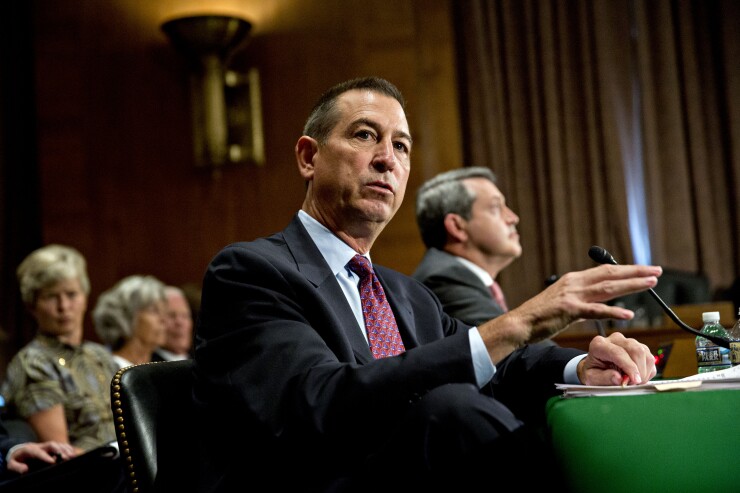WASHINGTON — The Office of the Comptroller of the Currency has room to improve in warding off regulatory capture in its examinations of large banks, according to a Government Accountability Office report.
The report, released Monday, identified gaps in documentation and other weaknesses that the watchdog said heightens the risk of agency officials being too cozy with the institutions they supervise.
“OCC has some policies that encourage transparency and accountability in its large bank supervision processes; however, weaknesses in documentation requirements may make large bank supervision more vulnerable to regulatory capture,” the report said. “Further, examination teams are required to delete drafts of key documents that memorialize reviews that are part of the supervisory process.”

The report made nine recommendations for the OCC — led by Comptroller of the Currency Joseph Otting — to strengthen its internal policies on supervising banks, including having more documentation on the internal deliberations between examiners and banks.
The GAO said the OCC has policies in place meant to ensure examiners remain objective in their oversight, but said the agency's approach to avoiding capture was narrow.
“For example, OCC only considers two factors when assessing the risk of capture: the tone of its media coverage and the extent to which examination staff rotate among banks,” the GAO report said. “OCC does not analyze other relevant factors, such as employee movement to and from industry or its supervision practices, which can impact this risk.”
Yet the agency largely disagreed with the report's findings. In a response, the OCC agreed with only one of the GAO's recommendations — that the agency revise instructions for doing the examination workpaper reviews — which the regulator said it was in the process of updating.
But the OCC disagreed with five other recommendations and was neutral on three.
A majority of the disagreements were related to the recommendations that the OCC collect more data and documentation about internal deliberations between examiners and banks. The agency argued it was “not prepared to implement” these recommendations.
“Retaining early drafts of conclusion memos and supervisory letters that might not have fully informed conclusions serves little purpose,” the OCC said in its response letter. “Additionally it is very important that OCC staff be able to efficiently and effectively retrieve pertinent supervisory information. Keeping extraneous information is counterproductive in that regard.”
Federal regulators, particularly of large banks, have frequently encountered criticism of examiners being too close to the institutions they supervise. In 2017, a GAO report
The GAO report on Monday said a lack of adequate data collection hinders the OCC from implementing its policy against conflicts of interest.
“For example, when staffing a bank examination team, OCC does not have a policy to verify that employees do not have active conflicts of interest by checking employee data,” the GAO report said. “OCC also does not periodically assess the implementation of its ethics program, including policies and procedures intended to help the agency meet ethics laws and regulations.”
The GAO also recommended that the OCC's chief counsel conduct periodic reviews of the agency’s ethics program and that the chief risk officer expand risk assessments beyond just reputational risk.





